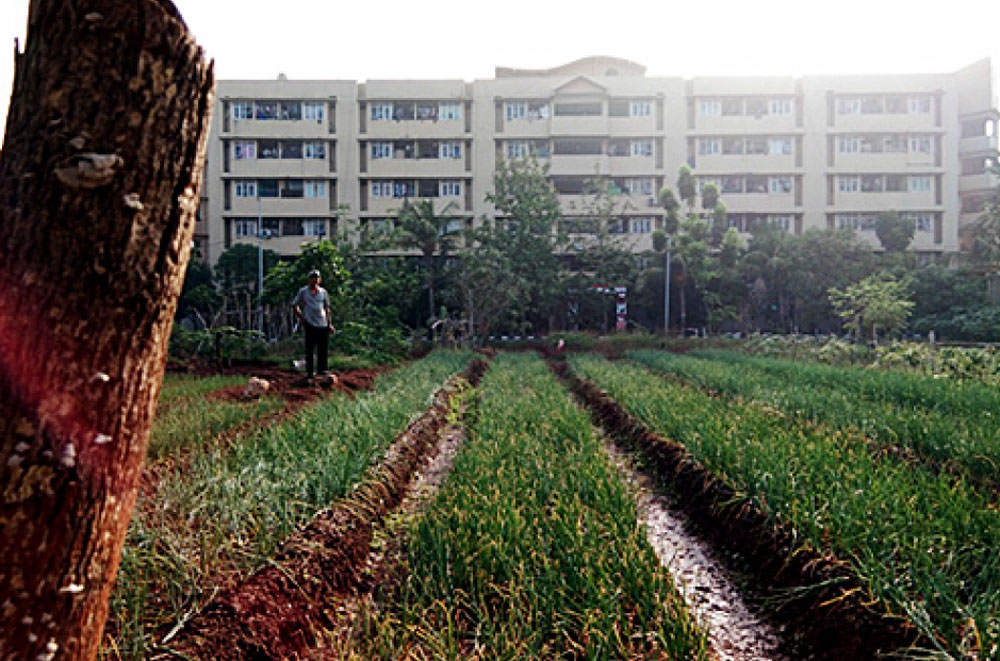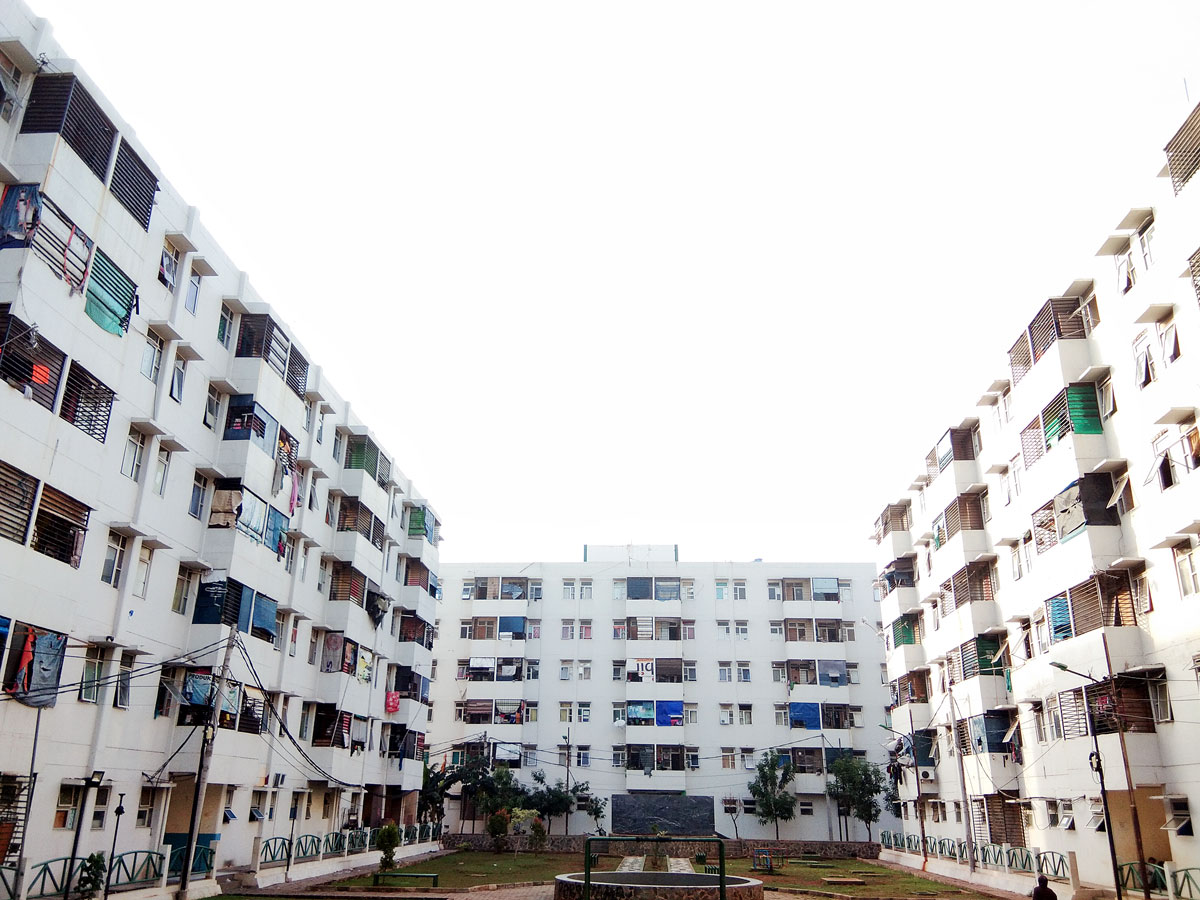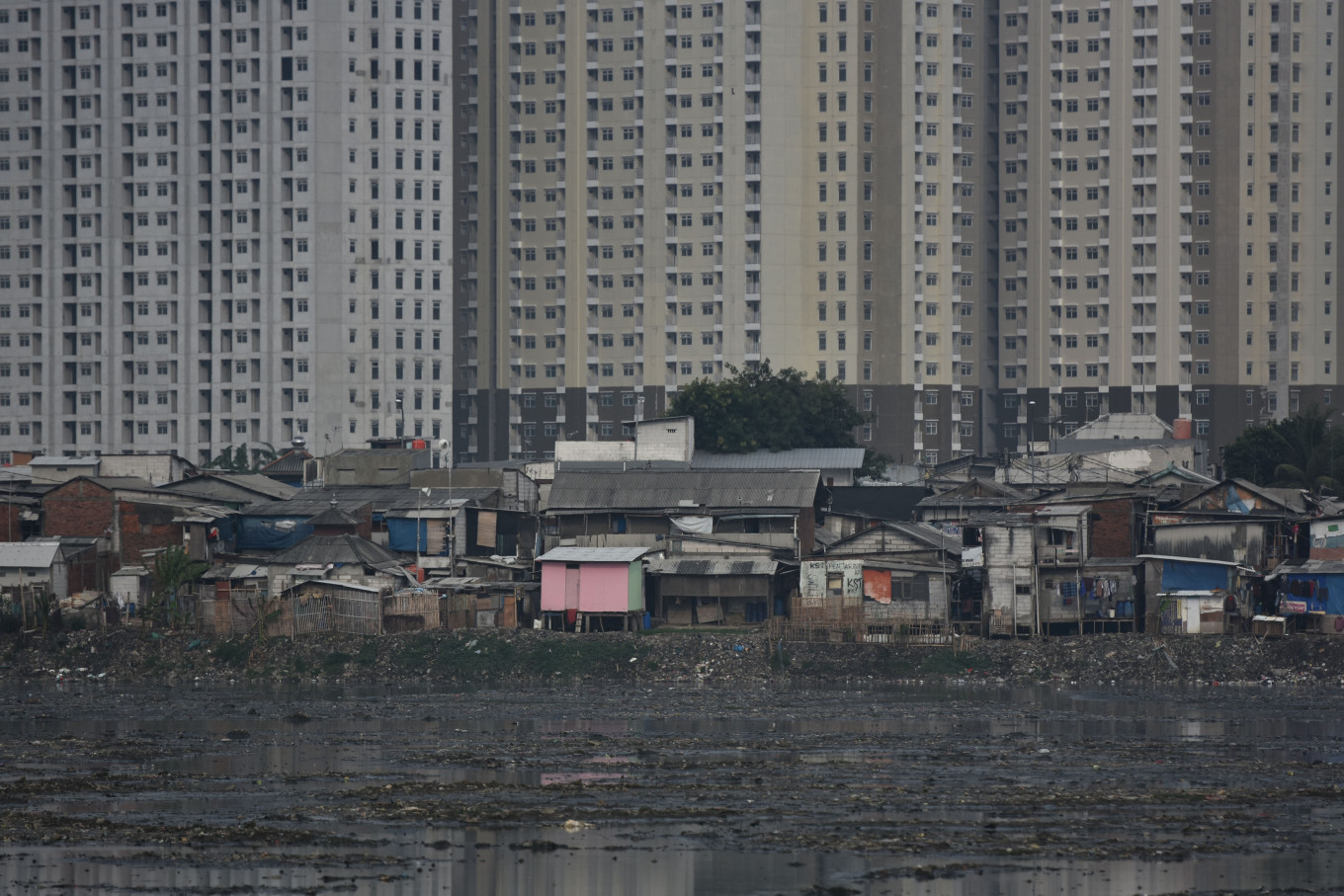The Living-in Experience, an internship program for less fortunate residents of Greater Jakarta, is part of the Recruitment & Training System for young reporters of The Jakarta Post. Below are personal accounts of those who recently took part in the three-day-and-two-night internship programs in Kampung Akuarium, Penjaringan district, North Jakarta; in Klender, East Jakarta and in Marunda, North Jakarta.
By: Ardila Syakriah
The Jakarta Post/Jakarta
A Transjakarta bus parks in the barren, pitch-black dark compound of the rent subsidized Muara Baru low-cost apartment complex (Rusunawa) in North Jakarta. There is no bus stop; only the bright light shining from in-side the bus shows the way for potential passengers.
Most of the people lining up to board the bus that evening were residents of the Marunda Rusunawa located further along the northern coastal area of Cilincing. Transjakarta buses provide the only free public transportation for residents of the apartment complex.
Many passengers stood in the packed aisle of the bus, hands clutching the hanging straps. One of them was Karyono, 56, a resident of the Marunda Rusunawa.
Karyono decided to rent a unit in one of the four clusters in his apartment complex after his previous home, located underneath the Jembatan Tiga overpass in Penjaringan, which he referred to as Kolong, was demolished during an eviction in 2015.
“The reason I decided to move was so that my daughters could have a better education,” he said.
Karyono has dealt with a total of 26 evictions throughout his life. Unwilling to give up, he and other evicted families would move from one place to another and rebuild their homes soon after.
It was only after the eviction in October three years ago that Karyono eventually signed up for a rental unit in cluster C of the Marunda Rusunawa, some 26 kilometers away from Kolong. His family is among the 2,167 families who had been relocated from various areas, such as Kalijodo, Muara Baru and Ancol, to the subsidized apartments as of early 2018.
The absence of job openings in his current neighborhood left Karyono with no other choice than to return to his previous line of work as a waste collector in Kolong.
With his informal job barely covering his daily needs on top of the hypercholesterolemia that has weakened his left foot, he could only afford to go home to see his wife and two children once a week if luck was on his side.
On his working days, he stays with his three other children who still reside under the toll road. Going home takes him up to two hours of bus rides; sometimes longer as the Transjakarta bus to Marunda operates on a situational route.
“There are many challenges. There are limited transportation and job options,” he said.
“Our livelihoods are still in the evicted areas. My friends still work there,” he continued, referring to three other evicted men from Kolong who had also moved to Marunda.
“Our livelihoods are still in the evicted areas. My friends still work there,” he continued, referring to three other evicted men from Kolong who had also moved to Marunda.
The nature of Karyono’s work, which depends largely on “long-time players”, made it difficult for him to start anew in Marunda. In addition, Karyono also complained about the lack of job vacancy information from the Marunda Rusunawa’s management unit.
One offer that had come to him was to farm an empty lot near his apartment block, a move the management encouraged.
“I would rather push the cart than farm. I could suffer from back pain […] It would take a long time to earn money, a minimum of 20 days,” he said.
Karyono is not the only one who commutes back and forth to his previous neighborhood to earn a living. The head of Marunda’s management unit, Ageng Darmintono, acknowledged it was a common tendency among many relocated residents.
“Many ex-Kalijodo residents still go there to work,” he said, referring to the formerly infamous red-light district that was demolished in 2016, as an example. He said, however, that the free Transjakarta buses provided by the regional government had proven sufficient.
However, head of the block C4 neighborhood unit, Mardani, 39, voiced his concern over relocated residents returning to the “faraway city” to work, as commuting might not be as easy.
“It would be difficult for those who don’t have vehicles [...] It could take three hours of waiting to get out of the apartment compounds due to the traffic,” he commented.
Mardani himself had moved to the apartment after floods hit his house in Marunda in 2015. He now works as a security guard at the apartment.
“Jobs on the security staff are prioritized for residents,” he said. Other roles at the apartment prioritized for its residents are sanitation workers, technicians and administration staff. This could mean the management unit might employ up to 242 out of the thousands of residents.
However, the unemployment rate among the residents remains high, with management unit head Ageng projecting it to reach 40 percent. As a result, the collective residents’ rent arrears amounted to Rp 10 billion ($US691,000) as of April 2018, as reported by kompas.com.
This did not go unnoticed by Ageng, who had just taken up his post in mid-November. He said he recognized the difficulties relocated residents faced starting anew at the apartment.
“It’s a process. They came from their comfort zones, no matter how unfeasible it was, to their discomfort zone,” he said.
Ageng said he was preparing to launch several programs to tackle the problem. These would include training sessions for the residents, as well as entrepreneurship and urban farming guidance. To accomplish this, he planned to team up with concerned NGOs, agencies and private sector entities.
“By doing so, residents can live here, work here and eat here,” he added.
The urban farming program has proven to be necessary as traditional markets are not easily accessible for residents, with the nearest being 7 km away from the apartment. Rusunawa Marunda also owns more than 200,000 square meters of open land, which offers agrarian potential to the apartment residents.
However, only a small number of residents have opted to plant crops there in search of income. One of them is Sutikno, 53. The former security guard had to give up his job after relocating to the apartment from Muara Baru in 2013. He has not been able to secure another job since then.
“Commuting was tiresome. I decided to quit as my workplace was so far away. I haven’t work again since living here,” he said.
Sutikno applied for security and sanitation jobs at the apartment to no avail. Seeing the empty lot next to block B10 where he lived, he decided to plant vegetables there in 2016. He has also farmed open land in cluster A. Now, with the apartment management planning to use the land in cluster B for a parking lot, his cluster A garden will become his sole source of income.
“My earning depends on the harvest, which could take up to two months. I usually check the market price and sell my vegetables at a slightly lower price,” he said, adding that his small income from farming could not cover his daily needs. As a result, he had to rely on his four children financially.
On the other hand, Warni, 43, who was evicted from her home along the Ancol riverbank in July 2015, said the profits of farming in cluster C could help her make ends meet. This was only possible because her husband managed to continue working at a domino workshop in Pasar Ikan after the relocation.
Asked whether she wanted to return to her previous job at a warehouse in Ancol, she expressed her contentment with selling vegetables, which allowed her to avoid commuting unless necessary. “I am lucky to find a liking of farming, unlike many of my friends, who are still unsure of what to do upon the relocation,” she said.
However, Warni said she remained wary, as there were possibilities of the apartment management making sudden changes in the land use, even though she had permission to farm on the lot.
“I hope the land could be used by the residents and not for other purposes. This is for the food security of residents themselves […] Moreover, it would benefit the apartment management if residents could pay the rent,” she said, adding that she had managed to stay debt-free thus far.
Sheltered under a tree just opposite the pavement where she usually rolls out her mat to sell vegetables, Warni let out a sigh at the searing heat that never seemed to cease. It had been a busy day for her from morning, when she picked the vegetables by herself to sell them until 10 or 11 a.m.
“It is impossible to survive here if we don’t work hard,” she said.
Searching for a better life despite spiraling debt
By: Dames Alexander Sinaga
The Jakarta Post/Jakarta
The floor was covered in commercial banners. The paint on the walls had started to peel off because of the humidity. Through the window, the wind brought sprinkles of rain. Karyono, 56, closed it, preventing the rain from getting into his apartment. He has been living in the Marunda low-cost apartments (Rusunawa), North Jakarta, since 2015, after he had been forcefully evicted from under the Pluit toll road near the Penjaringan city forest.
Every month, Karyono has to pay Rp 159,000 (US$11), a subsidized rent, to the Jakarta municipal administration. However, he has not been able to make the payment for two-and-a-half years.
“I was already aware that it’d be hard to pay the rent when I moved in. However, I thought that my daughters would have a better future here,” Karyono said.
He has been working as a recycled waste collector. In order to do so, he regularly travels around 30 kilometers to the slum beneath the Pluit toll road, the place where he previously lived with his family. Karyono takes the bus from his apartment, transits at the Muara Baru Rusunawa, and then goes on to the Penjaringan bus stop. From there, he has to walk around 5 km to reach the slum.
Sri Aswati, 53, his wife, sometimes sells bread in Cilincing. Together, they had seven children, but two of them passed away. His sons, Ardiansyah and Irfan, still live in Penjarinagn where they earn a living doing the same job as their father.

Karyono’s two youngest daughters live in the apartment, while his other daughter goes to a school near the toll road. This situation requires him to spend his weekdays in the slum and weekends at the apartment.
“I will also take her into the apartment after she graduates,” Karyono said of his oldest daughter, who is currently a senior in high school.
Moreover, he has come to realize that the slum was unsafe for his children, which became especially clear to him when his youngest daughter was molested by “her pedophilic religious teacher”.
Karyono added that his daughter was very young at the time.
He is not the only one who has returned to work in the slum, although he has an apartment in the Rusunawa. There are currently at least 200 families living beneath the toll road. Some of them had experienced eviction, but they returned to the area afterward.
At least 20 other Penjaringan families are registered at the Marunda Rusunawa, but only four families occupy their units.
“Once they are registered in the system, the bills will start coming although they don’t live here,” Karyono said.
Dewi, 52, a woman who lives near Karyono’s apartment, shared the fate of an evictee. However, she makes her living as a street hawker along the street side of the apartment complex, and thanks to that, she manages to pay the rent. Previously, she had tried to sell her wares to the people inside the complex, but could not make a profit. Dewi, who used to live in Kalijodo, then a red light district, has only one child to take care of, unlike Karyono.
“In Kalijodo, business was easier, while here, you have to be patient,” Dewi said.
Most of the tenants work as street hawkers, waste collectors, security guards, cleaners and app-based ojek (motorbike taxi) drivers. However, not all of the tenants are fortunate enough to hold a job or to be able to make a steady income.
Buyung, 60, is yet another evictee. He moved to the Marunda Rusunawa after being evicted from Glodok, Central Jakarta, with the hope of finding employment. Instead, he was told by the apartment’s management that he was too old and also had no diploma to prove his educational level, so he could not work for them. With-out the means to earn money, Buyung could not pay his rent and has been in arrears for more than two years.
“I was told by the management that I’m not qualified to work, even as a cleaner or security guard in the apartment,” Buyung said, holding back tears.
The apartment’s management requires that anyone working for them must have at least an elementary school diploma.
However, Buyung has managed to scrape out a subsistence living by using some vacant land in the apartment complex with permission from the management. He plants various greens; not for sale, but for his family.
Karyono, Dewi and Buyung are all evictees from the era of the administration of then-Jakarta governor Basuki “Ahok” Tjahaja Purnama. During his term in office, people from 11 locations were evicted, including from Pasar Ikan, Kalijodo, Waduk Pluit, Kali Krukut and Rajawati. The Marunda Rusunawa accommodate evictees from these locations.
In April, the total of amount of rent owed by relocated tenants reportedly stood at Rp 11 billion. Apartments in the building are rented out for Rp 128,000 to Rp 381,000 per month.
Mardani, the neighborhood unit (RT) head, said the difficulties in paying rent stemmed from the lack of close-by job opportunities. Some tenants are employed, but others could not find jobs because of a lack of academic certificates, limited job opportunities and age.
“Many of them don’t own vehicles,” Mardani said. “That makes it difficult for them to work outside the area of the apartment. Owning a vehicle would make it easier for the tenants to be more productive.”
Ageng Darmintono, head of the Marunda Rusunawa, admitted that many great challenges faced the tenants, mainly the debt problem. He was recently inaugurated as the head of the apartment’s management by Jakarta Governor Anies Baswedan.
Ageng has found that many relocated tenants are not good at managing their finances, and have become heavily indebted to loan sharks; making it even more difficult for them to pay their rent. Some are amateur entrepreneurs, who run their businesses sporadically.
“I am currently racking my brains, trying to find a solution. This is a great challenge for me. Pak governor told us during the inauguration that we must empower Jakartans, because this is where independence was declared,” Ageng said.
“The area is huge here. We want to make this apartment self-contained, meaning that tenants live, work and eat here,” he added.
Before Marunda, Ageng was head of the management of the Pulogebang Rusunawa in East Jakarta. He implemented community empowerment programs and planned to do the same in Marunda.
Ageng’s development programs include urban farming, waste management, creative economy entrepreneurship and culinary endeavors for the tenant community.
He said at least 40 percent of the tenants were casual workers.
“The Marunda apartments are already old. I am just trying to be a good tailor that makes something good to wear,” Ageng added.
The Marunda Rusunawa consist of four clusters with 29 blocks containing 2,880 apartments. Of that number, 2,640 are occupied, with 82 percent of the tenants living there under the subsidy program. The rest are low-income families.
Some apartment buildings are at least 20 years old and not well taken care of. Cracked walls and water leakages have become its main issues. The Marunda Rusunawa were first occupied in 2010, around three years after its construction.
Despite the conditions at the apartments, the tenants expressed hope that the management would empower them economically by designing a program that would suit their needs and characteristics.
“I would like to see the management develop our businesses, as there is still a lack of customers because of a lack of purchasing power,” Dewi said. “Our customers are mostly people who come from outside the area.”

| Writers | : | Ardila Syakriah, Dames Alexander Sinaga |
| Photographers | : | Ardila Syakriah, Dames Alexander Sinaga, David Caessarre |
| Managing Editor | : | Primastuti Handayani |
| Desk Editors | : | Pandaya, Imanuddin Razak |
| Art & Graphic Design Head | : | Budhi Button |
| Technology | : | Mustopa, Sandy Riady Hasan, Abdul Harris, Adri Putranto |
| Multimedia | : | Bayu Widhiatmoko |







